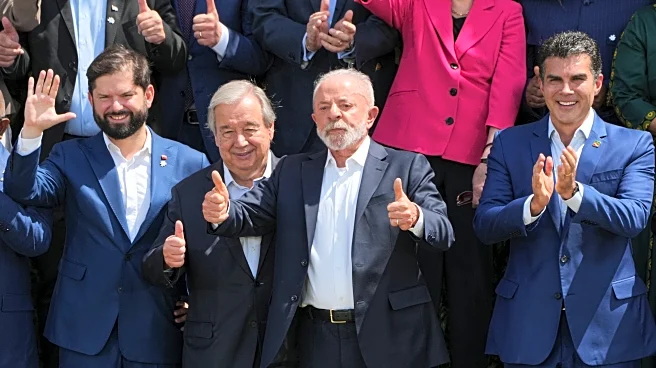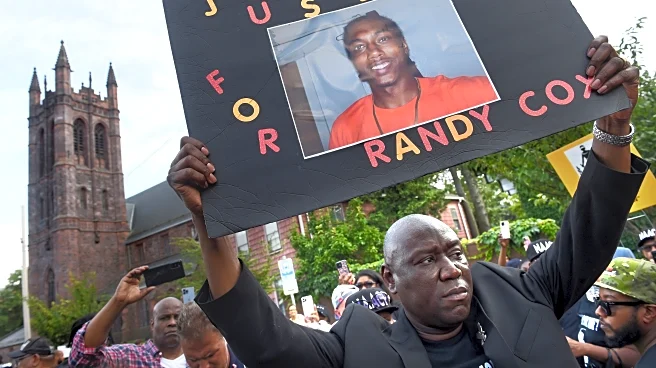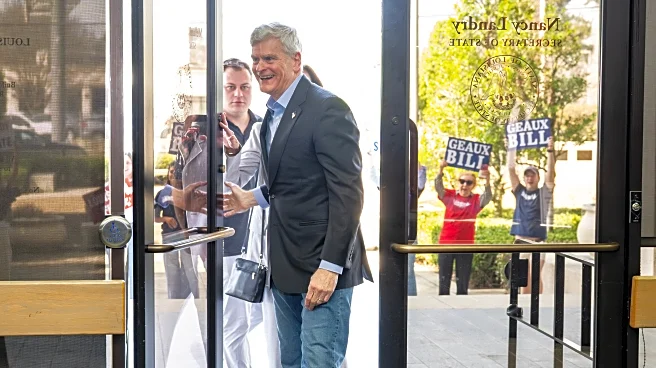BELEM, Brazil (AP) — Presidents and ministers gathered on the edge of the imperiled Amazon rainforest on Friday for a second day of the world's most important talks on climate change, as Brazil sought
more pledges for a fund to preserve tropical forests and countries discussed cutting emissions to keep global warming below catastrophic levels.
Brazil President Luiz Inácio Lula da Silva met with German Chancellor Friedrich Merz hoping to win his support for an ambitious financial incentive scheme to support the conservation of the world's endangered forests. Merz said afterward that Germany would make a “considerable” pledge, but didn't specify an amount.
“We are supporting this initiative, Germany is contributing considerably,” Merz said at a press conference. “If Germany says ‘considerable,’ it will be considerable.”
The initiative, dubbed the Tropical Forest Forever Facility, drew $5.5 billion in pledges on the first day of the U.N. climate summit, with Norway and France promising to join Brazil and Indonesia in investing. The fund eventually seeks to leverage investments into $125 billion that can be used to pay 74 developing countries for every hectare of forest they conserve.
Dozens of governments have expressed support for the fund and are engaged in talks to learn more about it, Brazil's Finance Minister Fernando Haddad said, including China and the United Arab Emirates. China’Vice Premier Ding Xuexiang said that the country “stands ready to strengthen cooperation with all parties on tropical rainforest conservation and make greater contributions,” without elaborating on a pledge.
The absence of pledges from some countries that praised the initiative, including the United Kingdom, was noticeable as governments face political and budget constraints.
Financed by interest-bearing debt instead of donations, the fund would invest its assets to generate returns that would be used to pay back the creditors and reward countries for curbing deforestation. Rather than relying on goodwill, the scheme aims to make it more lucrative for governments to keep their trees standing than cut them down for industrial farming or mining.
The fund’s rules also call for governments to set aside 20% of the compensation they receive to Indigenous peoples, who for millennia have managed and preserved lands.
“With that, we can overcome government policy fluctuations and secure a structure, an autonomous governance to support tropical forests,” Brazil’s Indigenous peoples minister, Sonia Guajajara, told reporters.
Forests, including the Amazon, where Brazil is hosting this year’s conference, play a crucial role in regulating the climate by absorbing huge amounts of carbon dioxide, a greenhouse gas that heats the planet when it’s released into the atmosphere.
The climate talks are expected to have a large presence of tribes, particularly from Brazil and surrounding countries.
But reduced participation in the summit revealed divisions among countries over how to cut greenhouse gas emissions, with U.S. President Donald Trump’s withdrawal from the Paris climate agreement hanging over the talks.
The U.S., which is responsible for over 10% of the world's emissions, did not send any senior officials to the summit. The heads of the other biggest polluters — China, India and Russia — also skipped the preliminary leaders' gathering ahead of formal climate talks that kick off on Monday.
Expanding global oil demand, rising concerns about energy security and escalating political tensions fueled by Trump's disdain for climate change have pulled attention away from net-zero commitments and slowed the green transition.
In many ways, Lula epitomizes those tensions.
Even as he champions deforestation efforts — and promised on Friday that Brazil was “not afraid to discuss the energy transition” — he has overseen an expansion in Brazil’s oil and gas production.
Just weeks before hosting the U.N. climate summit in Belem, his government granted permission to state-controlled oil company Petrobras to move a drillship to the mouth of the Amazon River, just 160 kilometers (100 miles) from the rainforest to search for more crude oil.
In a sign of the other issues competing for his attention, Lula's government said he would take a brief break from the climate summit over the weekend to attend a meeting in Colombia over Trump’s attacks on alleged drug-smuggling vessels off of Venezuela.
That comes as officials warn that time is running out to keep global warming below the key Paris Agreement benchmark of 1.5 degrees Celsius (2.7 Fahrenheit). Last year was the hottest year on record, with the average temperatures exceeding that limit for the first time.
Scientists say that every fraction of a degree of atmospheric heating unleashes more intense storms, longer droughts and deadlier heat waves.
___
The Associated Press’ climate and environmental coverage receives financial support from multiple private foundations. AP is solely responsible for all content. Find AP’s standards for working with philanthropies, a list of supporters and funded coverage areas at AP.org










